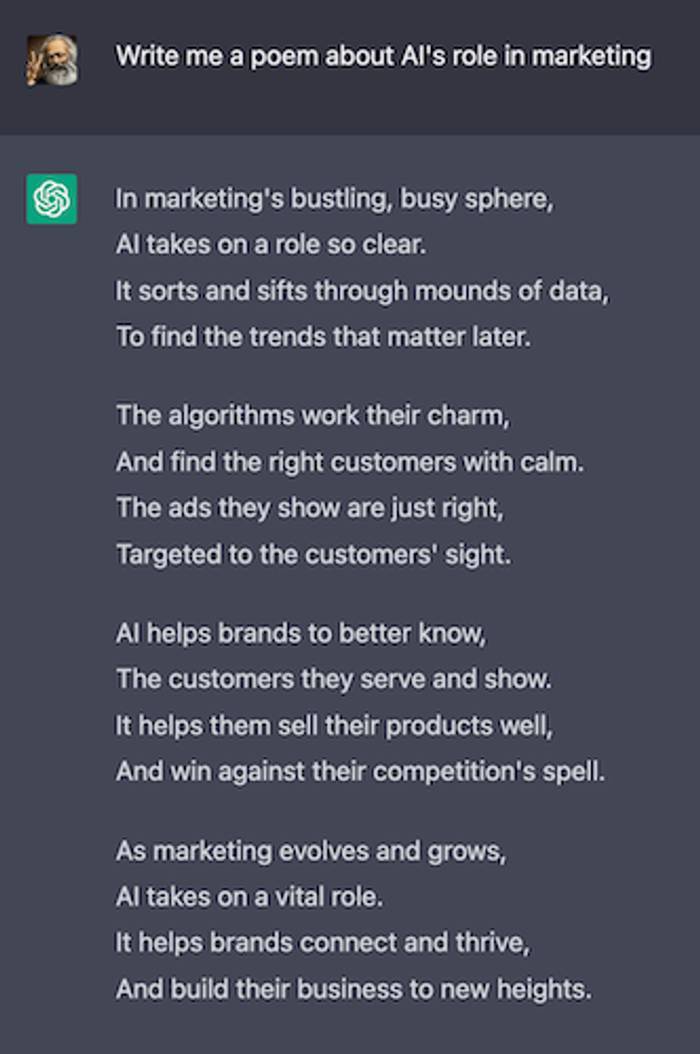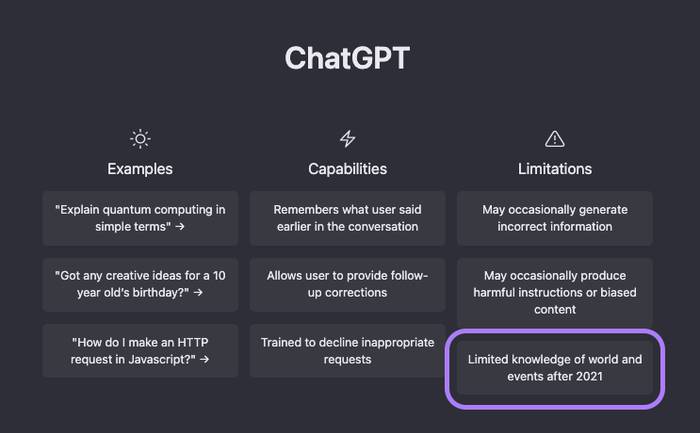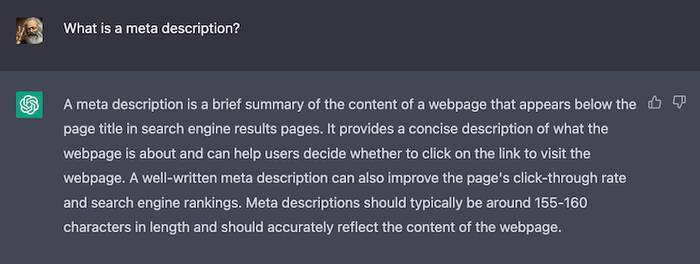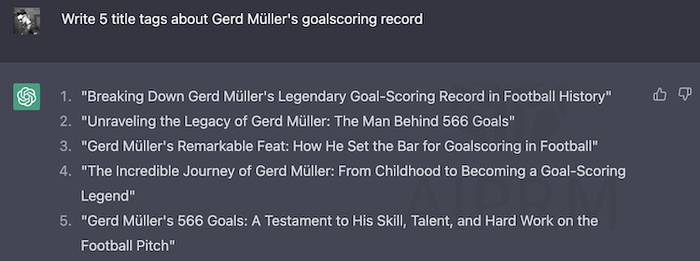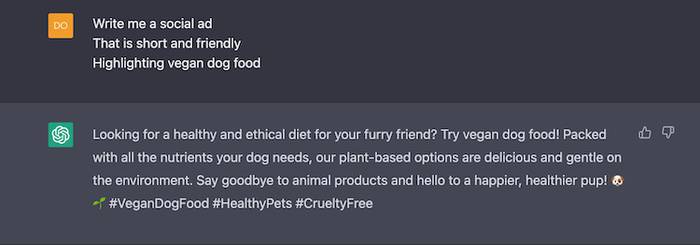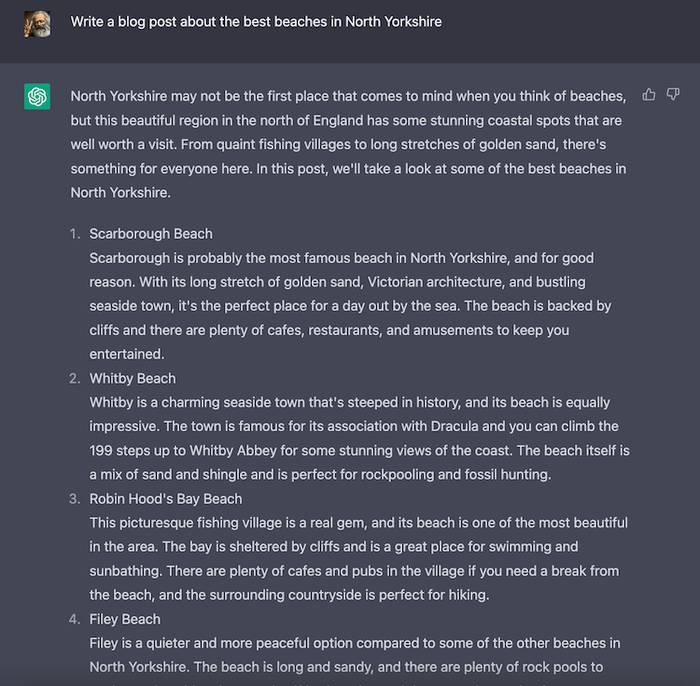For you marketers living under rocks, allow us to introduce ChatGPT: a chatbot that can create blog posts, press releases, title tags and meta descriptions — even craft song lyrics, pen poetry and write novels — at breakneck speed.
What does this mean for copywriters and SEOs? Danger of replacement at the hands of the automaton?
What is ChatGPT?
ChatGPT is an artificial intelligence (AI) chatbot developed by American research company OpenAI and launched in November 2022. It uses an impressive language model, GPT-3, to generate conversational, detailed and articulate text-based responses to any request or question.
It is a type of ‘generative AI’ — that is, it generates content. AI content is nothing new, but with over 100 million users, ChatGPT’s popularity and accessibility has ignited discussions about the impact of AI on content creation.
It’s impossible to avoid the hubbub of excitement (and mild existential panic) on LinkedIn and the Twittersphere at the impact of ChatGPT and AI impact for marketers, particularly content writers and SEOs.
ChatGPT is currently in its free-to-use ‘research preview’ phase and has knowledge that is mostly restricted to 2021. A paid version — ChatGPT Plus — promises users faster response speeds, uninterrupted access and some other features.
So, ChatGPT — friend or foe?
Note: since this blog post was created, GPT-4 (the language model powering ChatGPT) has been released. This blog post focuses on the previous iteration, GPT-3. We'll be sure to revisit in light of the more powerful version as soon as it's available!
What copywriting tasks is ChatGPT good at?
Any SEO content writer’s bread and butter is creating meta descriptions. As one of those more repetitive tasks, we naturally asked ChatGPT to define a meta description. It was pretty bang on.
However, when tasked with bringing this knowledge to bear by creating a meta description for our social media service page, it struggled a little to stay within its own character limit.
Even though meta descriptions aren’t ranking factors, including the key phrases can boost clickthrough and prevent Google rewrites. Here, ChatGPT also needed a little work to make sure the keyword optimisation was in there.
We did the same thing for title tags, this time asking for five suggestions on the topic of Gerd Müller’s goalscoring prowess. Sadly, all of the examples it provided were too long.
When prompted to reduce these to an appropriate length, there's no guarantee that the chatbot will contain all the keywords you've meticulously researched.
So, both when writing meta descriptions and title tags, ChatGPT struggles with verbosity and keyword targeting.
One workaround: asking ChatGPT to include certain phrases and to stay within a character limit. But, at this point, you may as well have written it yourself, right?
A similarly tedious task for any paid media marketer is creating variations of ad copy. ChatGPT to the rescue?
A solid performance, but probably requiring some slight tweaking.
For those humdrum digital marketing tasks, ChatGPT does need a little bit of a helping hand, but it can help to break through writer’s block by suggesting some neat starting copy and synonyms to consider.
What about writing an entire blog post?
ChatGPT can’t add enough value to long-form content (yet)
We asked ChatGPT to pen an article about the best beaches in North Yorkshire.
This is a great starting point — very impressive, in fact, to say it took ChatGPT shy of 30 seconds to produce.
But does this really add enough value to satisfy Google’s hunger for helpful, reliable, user-first content? I’d be amazed if this piece of content, posted verbatim, was to rank anywhere near the first page on Google.
For starters, it doesn’t mention the best cafés or pubs to visit, other attractions in the area, nearby walks, car parking information, whether the beaches are dog friendly, or any information about tide times. All things needed to create the very best piece of content on this topic.
The post would also have to be structured and formatted (not forgetting featured snippets) — and that’s not factoring in tone of voice. Then, if I asked ChatGPT to create a title tag and meta description for this post, as we've established, both would likely need some human editing to be SEO-ready.
ChatGPT generally provides a succinct, useful overview of a topic without going into any added-value detail or making fresh, unique insights; detail that’s crucial to succeed in Google Search, particularly with the focus on user-first content.
What is Google’s approach to AI-generated content?
For any writer creating content designed to drive organic traffic from search engines, the use of automatically-generated copy has traditionally been a no-no.
That’s an understatement, actually — it was against Google’s guidelines and a sure-fire way to get your website penalised and tank your organic visibility.
That was true, at least until February 2023. Google has now clarified its guidance on AI-generated content.
“Google’s ranking systems aim to reward original, high-quality content that demonstrates qualities of what we call E-E-A-T: expertise, experience, authoritativeness, and trustworthiness … however it is produced.”
All this comes as Google gradually softens its approach to AI, as evidenced by the recent launch of ‘Bard’, Google's own AI chatbot.
With plans to integrate the chatbot into its search interface, Bard will have a huge impact on SEO, raising the prospect of more zero-click searches and dwindling organic traffic to websites. Will this disincentive content creation? That’s probably a discussion for another day.
Back on topic: it no longer matters whether the content is created by a human or AI, as long as it is high quality and adds value for the user. Whether your rubbish content is created by a human or a robot, Google’s Helpful Content System no longer cares.
After all, humans have a long track record of trying to deceive Google with black-hat SEO tactics. Spammy content is spammy content.
“Appropriate use of AI or automation is not against our guidelines. This means that it is not used to generate content primarily to manipulate search rankings, which is against our spam policies.”
Can content written by ChatGPT perform in organic search?
In theory: yes. If AI can demonstrate experience, expertise, authoritativeness and trustworthiness (E-E-A-T) in the content it generates, then it will rank since Google no longer automatically considers AI content as spam. But can it actually do this at present, in practice? No.
We’re yet to see any evidence that strictly AI-generated content — without any human input — has ranked well in SERPs.
Any content writer worth their salt would easily be able to create a superior version of what ChatGPT can output, especially if they see ChatGPT as a useful tool powering the research and writing process.
With an output that's usually vastly inferior to most top-performing content, SEOs posting unedited ChatGPT content verbatim will struggle to gain much organic visibility.
Remember, too, that Google Search is Google’s most lucrative, important product. They want to preserve the integrity and quality of the results it serves up. Despite a softening stance to AI, there’s no guarantees that a Panda-style 2012 Google algorithm update won’t soon demote AI content.
Particularly on important topics like health and finance, ChatGPT content could be downright dangerous, and certainly won’t satisfy Google’s hunger for E-E-A-T content.
I want to use AI content, but I’m worried about Google penalties...
Because of Google’s new stance on AI, content created by machines isn’t going to be automatically demoted simply because it was created by a machine, but it’s unlikely to provide much value without a lot of editing — so be sure to meticulously fact check and edit any AI content you use.
If you’re considering incorporating tools like ChatGPT into your strategy and you’re anxious about your content being nuked in any algorithm updates, check out OpenAI’s useful tool for predicting the likelihood that a piece of text was generated by AI.
Could ChatGPT harm your reputation?
Regardless of organic search performance of AI content, there’s a huge moral discussion to be had around its use.
Can we hold a machine liable? Is it plagiarising what’s out there? There’s also a question of accuracy; CNETattracted widespread criticism for the factual mistakes in their AI-generated articles. An error-riddled health-related piece in Men’s Journal met with a similarly scathing response.
There’s PR to consider. At present, most people associate AI content with low quality; its use could harm your brand. Will your audience be offended and insulted if they suspect you’re using a robot to talk to them, rather than something that’s ever-so-lovingly crafted by a human?
ChatGPT struggles to communicate a brand’s tone of voice
Good content SEO isn’t just about optimising words on a page for search engines, but also reflecting the personality and ‘feel’ of a brand.
Once you’ve run enough queries through ChatGPT, you start to see familiarities in the phrasing of replies. It just doesn’t sound human or persuasive. It can't finesse copy to appeal to humans — at least at the moment...
Smartly enough, you can tell ChatGPT to imitate certain tones and styles of writing. Aiprm.com has created an interesting plugin for ChatGPT. One of its features makes it easy for users to ask ChatGPT to write in a certain way.
Let’s say you’re a travel brand who prefers to speak in a humorous, informative style. Here’s what the bot produced when asked to write a short passage about why it’s great to visit Cornwall.
What do you reckon? Passable, perhaps, but not knockout. ‘Breathtaking coastline that will take your breath away’ isn’t going to win any Pulitzer prizes (at least until the panel are AI).
At present, the human’s ability to reflect a brand’s tone of voice is far out of the grasp of a chatbot, but it might provide something workable which can then be tweaked.
What happens when we’re all using AI to generate our content?
The popular generative AI tools like ChatGPT, Jasper and Copy.ai all use the same documents to learn. Each of these tools also only has one language model — everything created stems from the same data.
So, let's take things to the extreme and assume everyone eventually starts drawing information from AI for their content. The natural conclusion is surely a regurgitated, valueless slew of cookie-cutter content.
In this apocalyptic copywriting landscape, content SEOs need to ask how they’re going to differentiate their output by bringing creativity and drawing insight that AI can’t (yet, anyway). This ‘useful’ content is the sort that will likely rank in SERPs.
This also raises the prospect of content creators developing their own in-house AI platforms.
Editors using AI still need to contribute to articles, adding subject matter expertise, rewriting, finding images, optimising for SEO and finessing a tone of voice.
The future of content marketing: human-guided AI?
Let’s avoid the Luddite extremes of decrying ChatGPT as some abominable affront to human creativity that should be avoided at all costs. Similarly, let’s not pretend that ChatGPT is suddenly going to cause all SEOs and content writers to start seeking a career change.
The likely role of ChatGPT (and other AI tools) in content writing is more nuanced: it can’t yet create content with enough value to satisfy Google’s E-E-A-T qualities. Generative AI still requires a lot of human input and interaction to produce something accurate, trustworthy and compelling.
But, in the right hands, AI can help us to expedite the content creation process. For tasks like writing meta descriptions and drafting different versions of ad copy, ChatGPT is yet another very impressive tool in our arsenal. It’s exciting.
For longer-form content, it falls flat at present, but with the right careful and creative prompts, can deliver some interesting recommendations and starting points for elaboration and further optimisation.
In certain sectors like health and finance, AI should be avoided like the plague, but its output could be used (with scrutiny) for other types of educational content.
To give themselves an advantage, we reckon the best content creators will develop their skillset to get the most out of AI, learning which prompts yield the most impressive output and fine-tuning the content.
Looking to level up your search visibility?
Get in touch todayPost by

Johnny bridges our content and SEO teams, creating and managing strategies that elevate clients' organic search visibility.
Project

